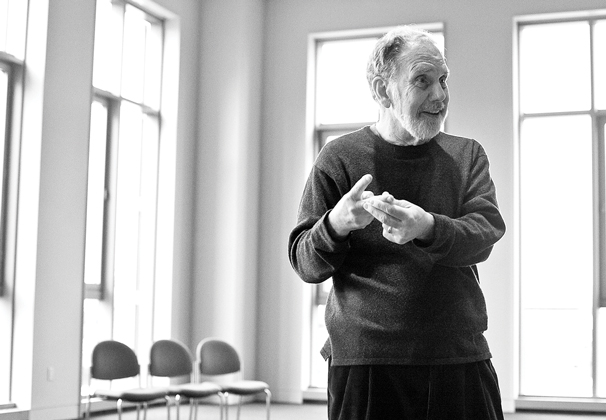NYU leadership divides faculty
March 13, 2013

Approximately 50 percent of eligible CAS faculty members have cast their ballot in the vote of no confidence as of 11 p.m. yesterday, halfway through the allotted voting period. Other NYU schools have not organized similar votes of no confidence.
*WSN did not request the figures for votes cast for or against NYU President John Sexton’s performance at time of press to avoid influencing the outcome of the final vote.
While the Faculty of Arts and Science continues to cast their e-ballots for the vote of no confidence against NYU President John Sexton, other faculty members have started discussions on the state of shared governance.
The Steinhardt Faculty Affairs Committee and the Steinhardt Faculty Council sent an email to the entire staff of the Steinhardt School of Culture, Education and Human Development on Monday asking them to consider a draft proposal of shared governance and the faculty bill of rights drafted by the NYU chapter of the American Association of Professors.
Professor of social studies education Robert Cohen explained that this is not a proposal for a vote of no confidence. Rather, it is a broader call to faculty members to discuss the issues of governance.
“We haven’t had a conversation yet with the whole school, but at least within the Faculty Council there is a concern about it, and that’s why they adopted the resolution,” Cohen said.
The Steinhardt faculty were asked to provide responses to the proposal by March 25, and the feedback will be discussed at the faculty meeting on April 8.
The proposal addresses similar concerns that the FAS has brought to light — including the lack of representation on the NYU 2031 plan — but also focuses on two less-publicized issues.
The first is the failure of the Board of Trustees to consult the faculty when the members voted to hire Sexton. Professor of education sociology and chair of the Steinhardt Faculty Council Floyd Hammack explained that sometimes when positions open at universities, a search committee is created to make recommendations and contribute to the selection for that position.
However, Martin Lipton, chair of the Board of Trustees, explained that part of the hiring process involved creating a committee consulting faculty, deans, students and alumni, who ended up supporting the decision to hire Sexton.
Another major concern that the proposal addresses is the lack of fiscal transparency.
“Obviously there are expenses that need to be paid for by individual schools,” said Hammack.
However, Hammack says that the concern among faculty is how the administration decides how much to tax the individual schools and on what basis.
While the Steinhardt faculty cannot predict what actions this discussion will lead to, Cohen said the faculty should not “zero-in” on Sexton.
“To me, the issue is beyond just one individual. It’s the whole style of governance that needs to become more responsive,” he said.
Hammack added that the administration has shown that it is listening to the concerns of the faculty.
“It’s well to keep in mind that the Faculty of Arts and Science doesn’t speak for the university as a whole,” Hammack said.
Meanwhile, other schools have not made public any discussion of their dissatisfaction with the administration. Chair of the Stern Faculty Council, professor Vasant Dhar, said the faculty of the Stern School of Business was satisfied with their representation on university issues.
“The Stern Faculty Council has found our administration to be responsive to Stern and university-wide issues we have raised,” Dhar said.
LSP professor Louis Pataki and chair of the LS Steering Committee said the administration has ultimate responsibility in decision-making.
“The question of a no-confidence vote in the NYU president has not been raised or suggested in any Liberal Studies faculty governance body,” Pataki said. “We need to have trust in our president and trustees to act in the best interest of the university.”
A version of this article appeared in the Wednesday, March 13 print edition. Nicole Brown is investigative editor. Email her at [email protected].
























































































































































Kate • Jun 29, 2013 at 6:51 pm
One Student’s Letter to John Sexton: http://www.youtube.com/watch?v=to-gVtd4vH4&feature=share
Anthony Reynolds • Mar 15, 2013 at 7:42 am
You end your article with a quote in support of Sexton by Liberal Studies’ Lou Pataki, the brother of former Republican governor George Pataki. A more representative view of the overall position of the Liberal Studies faculty might be more accurately represented by interviewing a few faculty members rather than only one faculty member who is ideologically predisposed to privilege corporate interests (look closely at who the NYU trustees are whom Sexton serves) over the educational mission of a…
David Martens • Mar 14, 2013 at 11:50 am
Mr. Sexton has jammed a multi billion project that can only be financed with debts from current and future students. His administration has never said how you will pay for these projects. How can the faculty be confident in your leadership? Since Mr. Sexton wants to run NYU as a corporation, at least provide transparency like corporations are forced to provide today.
REK • Mar 13, 2013 at 10:28 am
I would just note that no one knows the percentage of ballots cast for or against the Vote of No Confidence. The voting is encrypted and the results will be known only after ballotting closes at 6pm on Friday, March 15th. The WSN could not have revealed anything, since no one knows anything about how the voting is going, other than number of people who have cast their ballot.